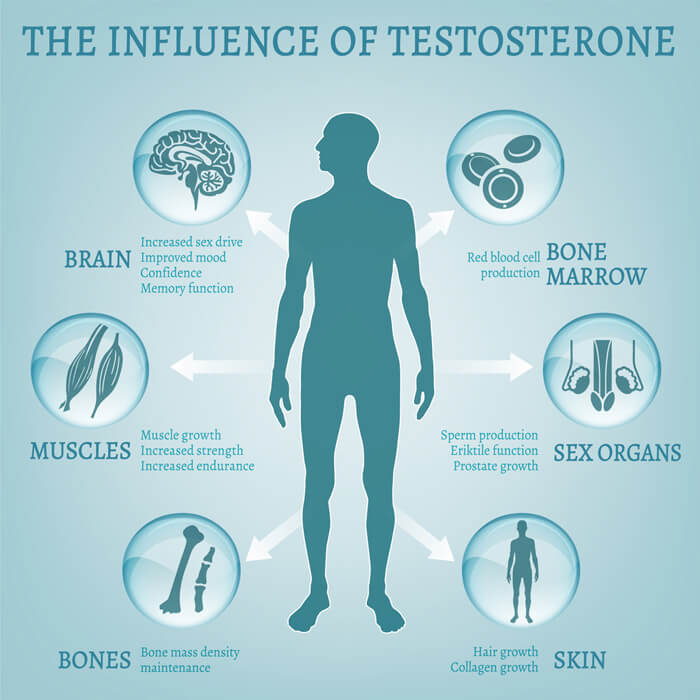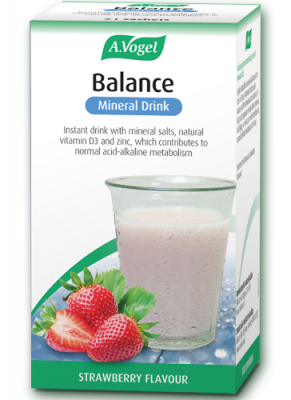What is testosterone?
Testosterone is the main male sex hormone. It is responsible for a number of things including sex drive, maintaining bone mass, fat distribution, muscle mass/strength and the production of red blood cells and sperm.

What causes low testosterone levels?
Testosterone levels rise during puberty then level off once men reach their late teens. The hormone then declines once again between the ages of 40 and 70, a process that is termed “andropause” or, alternatively, “the male menopause”. The latter isn’t completely accurate though as it suggests the drop in hormone levels are rapid, as is the case for women, when in reality testosterone declines at such a slow pace many men do not notice it.
In some cases, however, testosterone levels begin to decline naturally at the age of 30 making it more likely that, over time, symptoms will become noticeable.
Other things that can contribute to low testosterone levels include genes, medication and chronic diseases such as type 2 diabetes and obesity. In addition, one study even found that a diet high in sugar could trigger a significant reduction in male testosterone levels.1
How do you know if you have low testosterone?
Although many men will not have any apparent symptoms of falling testosterone levels, for others a number of issues can arise.
As testosterone plays an important role in muscle mass and strength, an absence of the hormone can contribute to loss of muscle mass, muscle weakness and frailty. The risk of osteoporosis also increases as due to this loss in muscle strength.
In addition to this the hormone assists with sexual functions and the development of mature sperm meaning too little can contribute to infertility, low libido and erectile dysfunction.
In the long term low testosterone may also result in mood swings, loss of body hair, swollen breast tissue, decreased bone mass and changes to the health of the skin.
If you have concerns about any of these things I’d recommend having a chat with your doctor because, as I explain further on in the blog, there are a number of things that can be done to help. It is also important to find out if low testosterone is actually to blame for your symptoms as it may be there are other issues at play.

Low testosterone and tiredness
Fatigue is another huge issue for men with low testosterone levels. This does not improve after a period of rest and occurs even when one’s routine involves plenty of sleep. With this problem it can also be hard to find the motivation to exercise as the energy levels are so reduced.
So, low testosterone levels can contribute to fatigue and tiredness but, equally, lack of sleep can contribute to low testosterone levels.
A study has found that men with poor sleep patterns tend to have lower levels of testosterone.2 Testosterone levels rise naturally during deep sleep, however, sleep deprivation means you don’t get this period of deep sleep and so hormone levels can decline.
How to treat low testosterone levels
If you are concerned about low testosterone levels then it is advisable to visit your GP. They may order a blood test to measure your hormone levels and if it turns out they are particularly low, the GP can then refer you to an endocrinologist who specialises in hormone problems.
In cases where testosterone levels are very low, hormone replacement therapy can be offered to relieve symptoms. This can be given in tablet form, patches, gels, implants and injections.
Often the symptoms of low testosterone don’t require treatment though, and instead a mixture of diet and lifestyle changes can improve things. This includes:
- Sleep – to tackle sleep deprivation and the resulting effects on your hormone levels try setting up a consistent sleep pattern. This will involve having a relaxing period before you go to bed where you read, take a bath, and avoid phones and computers. It will also involve going to bed at the same time each night and at a time that will ensure you get at least 8 hours of sleep
- De-stress - deep breathing techniques, practices such as yoga and even herbal remedies such as Stress Relief Daytime can help to ease symptoms of mild stress and anxiety. This will encourage a better night’s sleep which, in turn, should help to balance out your testosterone levels
- Adopt a healthy diet – fresh fruit and vegetables, wholegrains and fresh (not processed) meat and fish keeps the body healthy. This is important as being overweight can cause testosterone levels to fluctuate
- Participate in regular exercise – this can improve mood and increase energy levels, plus it keeps you fit and healthy! It is also recommended to restore muscle mass and function.
Lack of zinc can also cause a dip in testosterone levels – one particular study found that 4 weeks of zinc supplements prevented a decline in testosterone levels in sedentary men. Therefore, increasing your intake of this important mineral could help to even out your hormone levels.
Foods such as meat, legumes, shellfish and dairy all offer plenty of zinc but for a bit of extra support you could turn to our Balance Mineral Drink. With a helpful combination of magnesium, vitamin D, calcium, potassium and, of course, zinc, this product may help to relieve symptoms relating to low testosterone levels such as fatigue. It also maintains normal muscle function and bone maintenance, both of which can suffer when testosterone levels fall.
My Top Tip:
|





 Pour one sachet of Balance Mineral Drink into a glass containing 150ml of water or milk and then stir well. The drink has a natural strawberry flavour so is both refreshing and tasty!
Pour one sachet of Balance Mineral Drink into a glass containing 150ml of water or milk and then stir well. The drink has a natural strawberry flavour so is both refreshing and tasty!


